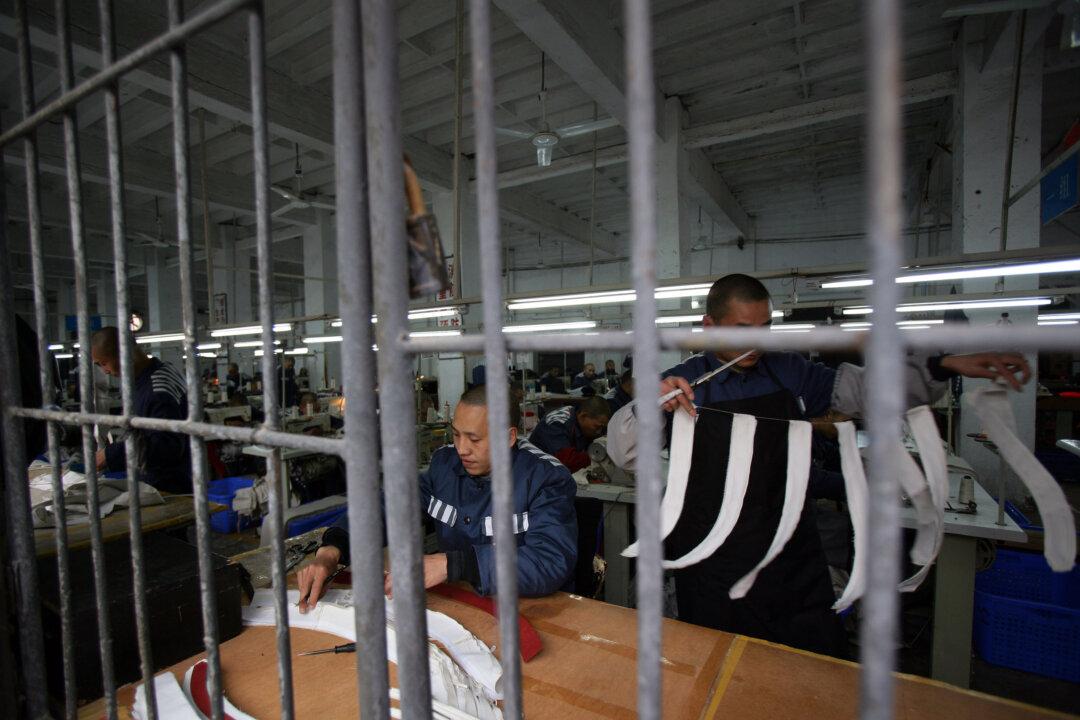For three years on and off, Li Dianqin worked for about 17 hours a day making cheap clothing—from bras to trousers—in a Chinese prison. She worked for no pay and faced punishment by prison guards if she failed to meet production quotas.
One time, a team of about 60 workers who couldn’t reach their quota were forced to work for three days straight, not allowed to eat or go to the bathroom. The guards would shock the prisoners with electric batons whenever they dozed off.
Li described the prison, Liaoning Women’s Prison, located in the northeastern Chinese city of Shenyang, Liaoning Province, as “not a place for humans to stay.”
“They arrest you and make you work. You eat food that is no better than pig feed and work like animals,” Li said.
Li, now 69 and living in New York, was imprisoned at the facility from 2007 to 2010 for refusing to give up her belief in the spiritual practice Falun Gong. The Chinese regime has maintained an expansive persecution campaign against Falun Gong since 1999, after the practice surged in popularity to roughly 100 million adherents, according to official estimates.
In addition to clothes, the prison made a range of goods destined for export, from artificial flowers to cosmetics to Halloween toys.
Li was but a tiny cog in China’s sprawling prison-labor machine, spitting out cheap products for distribution in the global supply chain.
The Chinese regime’s forced labor practices have drawn fresh scrutiny as U.S. customs officials in recent months clamped down on imports made with Chinese prison labor. Since September 2019, U.S. Customs and Border Protection (CBP) has issued four detention orders against Chinese companies, barring their goods from entering the country.
Prison and forced labor is “something that has infected the supply chain in China,” said Fred Rocafort, a former U.S. diplomat who now works for international law firm Harris Bricken. Rocafort spent more than a decade working as a commercial lawyer in China, where he conducted more than 100 audits of factories to inspect whether they were protecting the intellectual property of foreign brands he represented, and in some cases, to check whether they were using forced labor.
“This is a problem that has been around for much longer than the current human rights crisis in Xinjiang,” Rocafort said.
He said foreign companies would often outsource their manufacturing to suppliers in China, which would then contract with companies that used prison labor, or with prisons directly.
“If you’re a warden at a prison in China, you have access to labor, and you might be able to offer very competitive prices to ... the China supplier,” Rocafort said.
Criminal Enterprise
Li said Liaoning Women’s Prison was divided into many work units, each composed of hundreds of inmates. Li was in prison unit No. 10, where inmates were forced to make clothes from 7 a.m. to 9 p.m. every day. After that, each prisoner had to make about 10 to 15 artificial flower stems. Li typically didn’t finish until after midnight. Those who were slower—especially the elderly—sometimes stayed up all night to finish the work, Li said.“Chinese prisons are like hell,” she said. “There’s not a bit of personal freedom.”
Li still remembers the acrid smell generated by another prison unit that made cosmetics meant for South Korea. The burnt smell and dust that permeated the production floor made the workers short of breath and were the source of constant complaints—though they couldn’t let the guards hear them, or else they would get beaten, Li said.
She once overheard a conversation between prison guards, during which she learned that the prison was “renting” each inmate from the provincial justice bureau at a price of about 10,000 yuan ($1,445) per head per year.
At one point, the superintendent during a prison-wide meeting urged everyone to “work hard” because the “prison will grow and expand,” Li said.
The prison also made ghost decorations for Halloween by the truckload for export. Li had to pin black cloth around the ghosts with an iron wire. She later saw the same kind of decoration adorning an apartment door while walking in a New York neighborhood around Halloween.
In 2000, Li, who is from Shenyang, was herself detained at Masanjia Labor Camp, where she worked from morning to night making plastic flowers.
While the flowers ended up looking “just gorgeous,” making them was torture, Li said. Inmates were not supplied with gloves or masks to protect against the toxic mist formed by the plastic particles that filled the air. All the guards wore masks.
The laborers weren’t allowed any breaks except to go to the bathroom, which required a signature from the guard. Hygiene standards were nonexistent.
“Washing your hands is not a thing. You working more is all that matters,” Li said.
Vast Network
Wang Zhiyuan, director of U.S.-based nonprofit World Organization to Investigate the Persecution of Falun Gong, said the Chinese prison labor industry is a sprawling economic machine that falls under the supervision of the regime’s judiciary system.He described the regime’s ability to tap into this unreported source of labor as a “powerful strategic weapon” to advance Beijing’s global economic ambitions.
“Regardless of how much tariffs the United States imposes on China, the Chinese Communist Party’s slave labor industry will not be significantly affected,” Wang said.
Even though the regime formally abolished its labor camp system in 2013, findings from the report suggest that the forced labor industry is alive and well.
The labor camps simply changed their names and merged into the prison system, Wang said, like “offering the same medicine with a different broth.”






